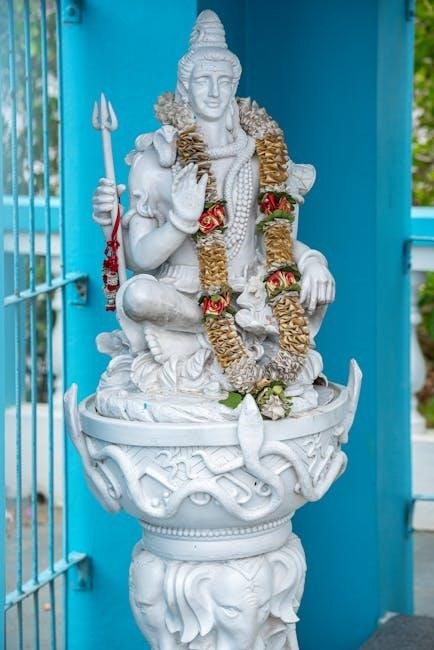The Shiva Ashtottara Shatanamavali is a revered text comprising 108 sacred names of Lord Shiva, each embodying his divine attributes and spiritual significance. Available in Telugu PDF, it serves as a powerful tool for devotees to connect with Lord Shiva through chanting and worship, fostering peace and divine blessings.
Overview of the Significance of Shiva Ashtottara Shatanamavali
The Shiva Ashtottara Shatanamavali holds immense spiritual significance as a collection of 108 divine names of Lord Shiva, each representing his distinct attributes and powers; These names are deeply rooted in Hindu scriptures and are believed to embody the essence of Lord Shiva’s divine nature. Chanting these names is considered a powerful devotional practice, offering peace, prosperity, and spiritual growth. It is often recited during worship, rituals, and meditation to seek Lord Shiva’s blessings and to connect with his divine energy. The Shatanamavali is not just a list of names but a meditation on the divine, helping devotees transcend worldly concerns and attain spiritual enlightenment. Its significance lies in its ability to inspire devotion, foster inner peace, and guide seekers on the path to self-realization.
Importance of Chanting the 108 Names of Lord Shiva
Chanting the 108 names of Lord Shiva, as outlined in the Shiva Ashtottara Shatanamavali, is a deeply revered practice in Hinduism. These names are considered powerful mantras that embody Lord Shiva’s divine attributes and energies. Chanting them is believed to bring peace of mind, spiritual growth, and prosperity. Each name carries specific vibrations that are thought to purify the mind, ward off negativity, and attract divine grace. Devotees chant these names to seek Lord Shiva’s blessings, particularly during worship, meditation, or special occasions. Regular chanting is also believed to enhance self-awareness and foster a deeper connection with the divine. The practice is considered a profound expression of devotion, offering both spiritual and emotional fulfillment to those who recite it with faith and sincerity.

Historical and Spiritual Context
The Shiva Ashtottara Shatanamavali, rooted in ancient Hindu scriptures, is a sacred text with deep spiritual significance. It is a powerful mantra reflecting Lord Shiva’s divine essence and attributes, preserved and revered for centuries.
The Origin and Evolution of Shiva Ashtottara Shatanamavali
The Shiva Ashtottara Shatanamavali, a collection of 108 sacred names of Lord Shiva, traces its origins to ancient Hindu scriptures and Vedic traditions. These names, steeped in spiritual significance, reflect the diverse attributes and forms of Lord Shiva, making it a revered text for devotees. The evolution of this Shatanamavali is closely tied to the Puranas and Smritis, which detail the glories of Shiva; Over time, the text has been adapted into various languages, including Telugu, to cater to regional devotees. The Telugu version preserves the original essence, allowing followers to connect with Shiva’s divine energy through chanting. This sacred list is considered a powerful mantra, believed to bring peace, blessings, and spiritual growth to those who recite it with devotion.

Spiritual Benefits of Reciting the Shatanamavali
Reciting the Shiva Ashtottara Shatanamavali is believed to bestow numerous spiritual benefits, including peace of mind, emotional harmony, and divine grace. Chanting these 108 names of Lord Shiva is considered a powerful practice that fosters spiritual growth and inner purification. Devotees believe it helps in overcoming life’s challenges, warding off negative energies, and attracting positive vibrations. Regular recitation is also thought to enhance devotion, self-discipline, and mental clarity. The Telugu PDF version of the Shatanamavali makes it accessible for regional devotees to perform this sacred chanting with ease and precision, ensuring they experience the profound blessings of Lord Shiva. This practice is deeply revered in Hinduism as a means to connect with the divine and attain spiritual liberation.

Structure and Content
The Shiva Ashtottara Shatanamavali is structured as a list of 108 names, each describing Lord Shiva’s divine attributes. The Telugu PDF version presents these names in a clear, organized format, making it easy for devotees to recite and reflect on his divine qualities.
The 108 Names of Lord Shiva: Their Meaning and Relevance
The 108 names of Lord Shiva, as detailed in the Shiva Ashtottara Shatanamavali, hold profound spiritual and philosophical significance. Each name reflects a unique attribute, power, or aspect of Lord Shiva, such as his cosmic roles, divine qualities, and benevolent nature. These names are not merely titles but encapsulate the essence of Shiva’s supremacy and his role as the destroyer of evil and the bestower of blessings. The Telugu PDF version of the Shatanamavali presents these names in a devotional format, enabling devotees to chant and meditate on them. Chanting these names is believed to bring spiritual purification, inner peace, and divine grace, making them a cornerstone of Shiva worship and devotion.
How the Names Reflect the Attributes of Lord Shiva
The 108 names of Lord Shiva in the Shiva Ashtottara Shatanamavali are a poetic and devotional representation of his divine attributes. Each name highlights a specific aspect of Shiva, such as his cosmic roles, divine qualities, and benevolent nature. For instance, names like “Shiva” and “Maheshwara” emphasize his role as the destroyer of evil and the supreme ruler, while “Nataraja” reflects his cosmic dance, symbolizing creation and destruction.
Other names, such as “Kailasapati” and “Sambhu,” highlight his abode in Kailasa and his compassionate form. These names collectively paint a vivid picture of Shiva’s multifaceted personality, blending his fearsome and benevolent aspects. The Telugu PDF version of the Shatanamavali ensures these divine attributes are accessible for devotion and reflection, helping seekers connect with Shiva’s divine essence for spiritual growth and blessings.
Shiva Ashtottara Shatanamavali in Telugu

The Shiva Ashtottara Shatanamavali in Telugu is a sacred hymn containing 108 names of Lord Shiva, each reflecting his divine attributes and spiritual significance. The Telugu PDF version is widely available, offering devotees a convenient way to chant and worship, seeking peace and blessings from Lord Shiva.

Availability of the Telugu PDF Version
The Telugu PDF version of the Shiva Ashtottara Shatanamavali is widely accessible online, offering devotees a convenient way to download and utilize this sacred text. Websites like Vaidika Vignanam and Stotranidhi provide free downloads, ensuring easy access for those seeking to chant the 108 names of Lord Shiva. Additionally, platforms such as vignanam.org offer the document in simplified Telugu script with correct anusvaras, catering to both traditional and modern readers. Devotees can also find this PDF on various spiritual and devotional forums, making it readily available for personal worship or community chanting. The PDF’s digital format ensures portability and ease of use, allowing devotees to carry the sacred text wherever they go.
Key Features of the Telugu PDF Document
The Telugu PDF of Shiva Ashtottara Shatanamavali is designed for easy readability and spiritual practice. It features the 108 names of Lord Shiva in a clear, simplified Telugu script, making it accessible to all devotees. The document includes proper anusvaras and traditional markings, ensuring authenticity and ease of chanting. Additionally, the PDF is lightweight and portable, allowing users to carry it on smartphones or tablets for convenient access during puja or meditation. Many versions include an English transliteration alongside the Telugu text, aiding non-native speakers in accurate pronunciation. The layout is clean and well-organized, with each name numbered for easy tracking. This PDF is a valuable resource for those seeking to deepen their connection with Lord Shiva through dedicated worship and recitation.

How to Use the Shiva Ashtottara Shatanamavali
Download the Telugu PDF, find a quiet space, and chant the 108 names with devotion. Use it during puja, meditation, or daily worship to connect with Lord Shiva’s divine energy.

Guidelines for Chanting the Shatanamavali
Chanting the Shiva Ashtottara Shatanamavali requires purity of mind and body. Begin with a clean heart and bathe before reciting the names. Ideal places for chanting include Shiva temples or a quiet, sacred space at home. Chanting during auspicious times like Maha Shivaratri or on Mondays is highly recommended. Use a mala (rosary) to keep track of the 108 names, ensuring concentration and devotion. Recite each name clearly, focusing on its meaning and significance. Maintain a steady tone and rhythm to enhance the spiritual experience. Regular practice fosters a deeper connection with Lord Shiva, seeking his blessings and spiritual growth. The Telugu PDF version provides easy access to the chants, making it convenient for devotees to follow and recite the Shatanamavali with precision and faith.
Best Practices for Downloading and Utilizing the PDF
Downloading the Shiva Ashtottara Shatanamavali in Telugu PDF is straightforward, with versions available on trusted spiritual websites. Ensure the source is reliable to avoid malware. Once downloaded, store it respectfully, ideally in a folder dedicated to spiritual content. For optimal use, print the PDF on high-quality paper or view it digitally in a calm, serene environment. Recite the names with clarity and devotion, using a mala to keep track. Regular practice enhances spiritual benefits, fostering peace and connection with Lord Shiva. Consider learning the meanings of the names to deepen your understanding and devotion. This sacred text is a powerful tool for worship, making it a valuable addition to your spiritual practice.
The Shiva Ashtottara Shatanamavali is a sacred and powerful devotional text, offering 108 names that encapsulate Lord Shiva’s divine essence. Its availability in Telugu PDF format makes it accessible to millions, enabling devotees to chant and reflect on these names with ease. Regular recitation fosters spiritual growth, peace, and a deeper connection with Lord Shiva. Downloading the PDF from trusted sources ensures authenticity and quality, enhancing your worship experience. Embrace this timeless text to seek blessings, inner calm, and a profound spiritual journey. Let the 108 names of Shiva guide you toward enlightenment and harmony in life.
